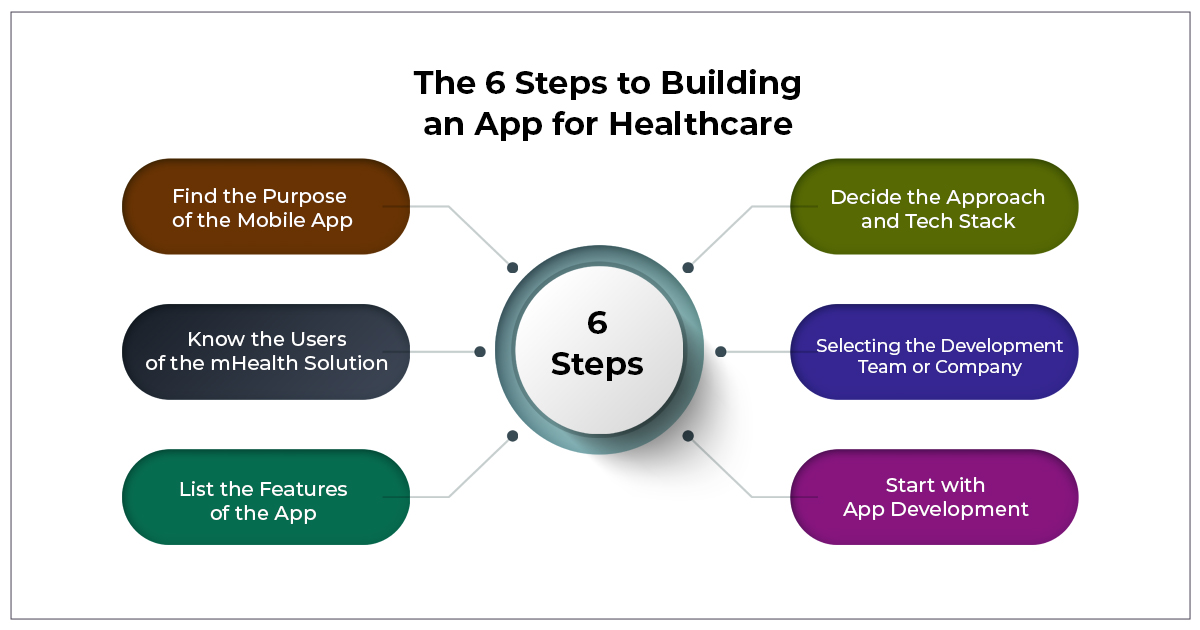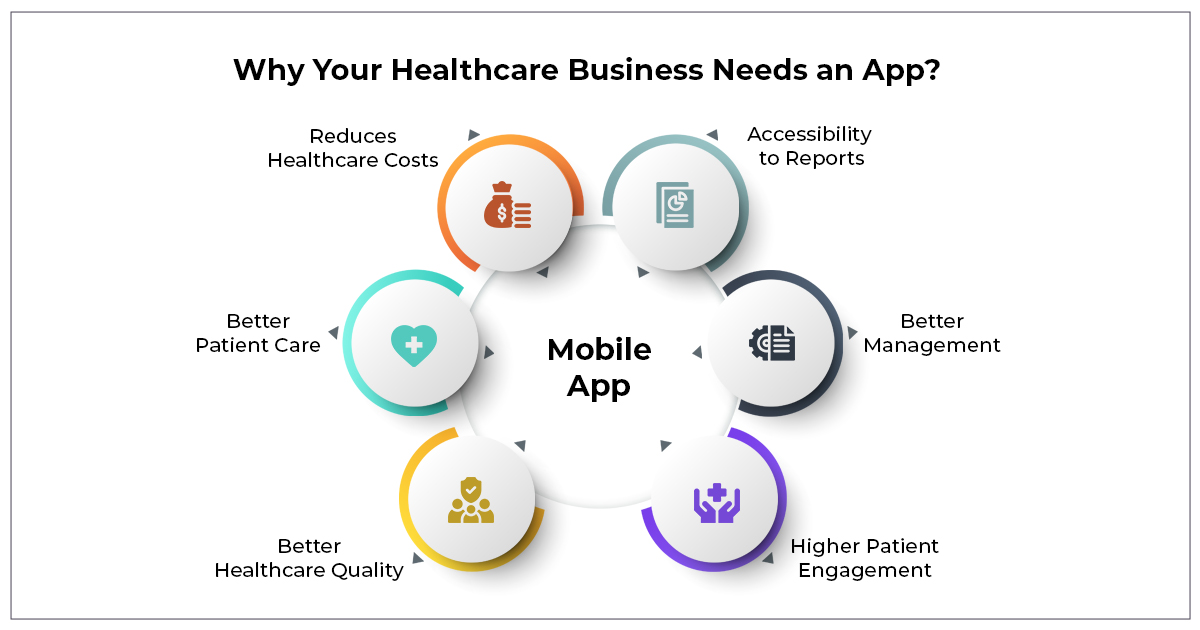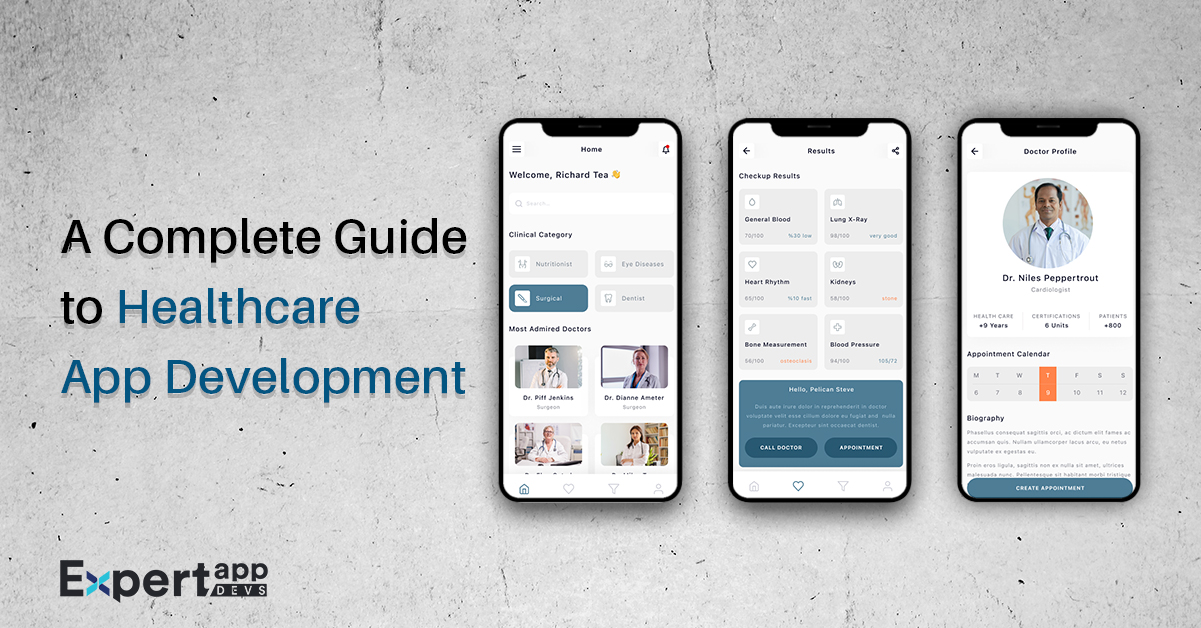Healthcare App Development: A Complete Guide
The Healthcare industry is continually battling inflation and resource shortages. The rising healthcare expenditures are estimated to reach $600 billion by 2027 (McKinsey).
It’s time for all the stakeholders to gather together to help make healthcare affordable and accessible. This can reduce expenditure and risk while improving profits. The digital healthcare market is responding to the need for immediate and accessible care.
The global digital health market will be valued at $430.52 billion by 2028 (Globe Newswire). mHealth, or healthcare mobile app solutions, is a critical part of the digital industry. They resolve issues related to the delivery of care, administration, and even access to doctors with greater appeal.
However, we have just scratched the tip of the mine of opportunities. The shifting mindsets and rising demands call for innovators and solution providers.
If you have an exclusive app idea, now is the time to build the solution to make a difference. In this guide, we will take you through the trends, steps and even the benefits of healthcare app development. So, let’s get started.
Healthcare App Development Demystified: 6 Key Steps
Healthcare mobile apps reinstate faith in the industry by offering accessible and affordable solutions. There are different facets to mHealth, including fitness solutions and telemedicine apps. However, the path to building a successful healthcare mobile app remains the same. Let’s discuss the steps in detail.

Step#1: Find the Purpose of the Mobile App
Knowing why you want to build the app and the ultimate goal you aim to achieve with the mobile app. If you are building a telemedicine app that can help people connect with all types of doctors and chat with them in real time, your goal is accessibility.
To know the objective, you should:
- Understand the gaps in the current healthcare system, especially the niche you are looking at
- Know the competition that rules the niche. Check out what makes them different from the others
- Validate the need for an app idea or concept; you have to check if it aligns with the goals of the end-user
Step#2: Know the Users of the mHealth Solution
The next immediate step is to acknowledge the end users. Who will be using the mobile health solution you are offering?
For example, telemedicine apps are used by people facing issues that care providers can solve via phone calls. It could also be someone living in a remote area without access to doctors.
You can segregate the users using the following pointers:
- Check out their demographics and identify the ones that match your use case
- Look for people with an accepting mindset who need a telemedicine solution
- Users who are looking for immediate access to doctors and healthcare deliveries
These are just a few instances of how you can find the user for the mobile app. There will be several use cases for you.
Step#3: List the Features of the App
Based on your understanding of the user and the existing gaps, you can know the features that can help you build a solid and usable application.
The list of features should be divided into two parts: the must-haves and the advanced features. The must-have features could include login/registration, creating the profile, checkout systems (in case you allow them to make in-app payments), filters, booking an appointment, and so on.
Based on the type of application, your must-have features will change. For example, a fitness application will have recording and logging features. It could also include diet in the must-have functionality.
Advanced features will include the use of the latest technologies. For example, using AI, you could build an advanced search filter for smart searches. These may not be critical features; however, they can make your application engaging.
Step#4: Decide the Approach and Tech Stack
When developing a mobile healthcare app, you should know the approach you plan to take. You can either build a native application (iOS or Android) or take the cross-platform development route.
Depending on the approach you take, you can choose the tech stack. For example, if you plan a native iOS mobile app, you can use either Swift or Objective-C to program the mobile application. Similarly, if you are planning cross-platform app development, you can use React Native or Flutter.
Step#5: Selecting the Development Team or Company
If you are a healthcare provider or company, mobile app development isn’t your area of expertise. You should outsource it to a healthcare app development company with the right expertise and experience building mHealth solutions.
When selecting the app development partner, here are a few things to consider:
- Know if they have experience building healthcare app solutions
- Check if they know the latest trends and developments in the niche
- Look for companies that have the license to operate and the credentials
- They should be aware of the healthcare protocols and compliances
- They should have good ratings and reviews from past clients
Step#6: Start with App Development
The final step is to build the mobile app solution. You have the requirements and the purpose. At this point, you have validated the use case and decided on the features. It is now time to start working on app development.
Start by prototyping the mobile app solution. You can create the screens, plan the navigation and design the user experience based on your past experiences.
Once you are sure of the app’s usability, you can start coding the mobile app. After thorough testing and running it in staging mode, you can deploy the mobile application.
Why Your Healthcare Businesses Need an App Solution?
Let’s try answering how a mobile healthcare app can be useful to doctors and end users. It will help you realise whether your app idea could be useful to them.

1. Reduces Healthcare Costs
Affordability is the need of the hour, especially for the healthcare industry. With mobile app solutions, you can achieve this goal. Most overhead costs are due to mismanagement of records, inaccurate billing, and inefficient processes.
However, the mobile app can reduce patient wait time, enhance billing solutions, and make your business more efficient. As a result, the overall spending is reduced, leading to more affordable care.
2. Accessibility to Reports
When a single patient connects with two doctors, the app can become their point of management. The records are stored in the app, and both doctors can access them. As a result, the diagnosis is efficient, and the overall care is better.
3. Better Patient Care
There are several aspects of patient care that can undermine your efforts. For instance, if the appointment is not properly managed, it can hamper their experience. If the patient’s records are not stored properly, they may not get the papers on time. Lastly, if the diagnosis is inaccurate, the care plan may not be up to the mark.
Mobile apps can effortlessly manage the patient care aspects from record logs to diagnosis, thus making it easier to treat the patients.
4. Better Management
When a doctor uses the healthcare app for their clinic or hospital, it helps ease the stress of management. With these applications, the doctor need not worry about administration tasks such as sending out reminders, retaining their clients, etc.
As a result, it gives them time to focus on innovating the clinic and offering better solutions to the patient. It also helps relieve them of all their stress.
5. Better Healthcare Quality
The quality of healthcare has improved substantially with mobile apps. Most of the mundane tasks are automated in the process of healthcare delivery. As a result, doctors are able to offer better assistance to patients, diagnose their conditions in the most effective manner, and provide quality solutions.
6. Higher Patient Engagement
As a result of the positives of mobile app solutions, patient-doctor engagement increases. This improves the retention ability of the hospital or clinic.
Types of Healthcare Mobile Apps
You now know the benefits of building a healthcare mobile app. Let’s take a quick look at the different types of healthcare app solutions.
Let’s divide these types into three categories: providers, patients, and admin.
Healthcare Apps for Patients
| Application | Description |
| Appointment Scheduling Solutions |
|
| Doctor-on-demand Apps |
|
| Fitness & Wellness |
|
| Mental Health |
|
Healthcare Apps for Providers
| Application | Description |
| Clinical Communication Apps |
|
| Medical Record Apps |
|
| Remote Patient Monitoring |
|
| Barcode Scanning Apps |
|
| Medication Dosage Apps |
|
| Risk Assessment Apps |
|
Healthcare Apps for Admin
| Application | Description |
| Inventory Management |
|
| Billing Solutions |
|
Healthcare App Development Cost
The average cost of developing a basic healthcare mobile app is $425000. You might need to pay a little extra for all the advanced technologies and features you wish to add.
Hourly charges for developers
- USA: $80-$250
- Eastern Europe: $70-$150
- India: $15-$100
Healthcare development costs depend on several factors. Let’s discuss them one by one.
App Complexity: If your app demands too many features or needs some advanced functionality, your cost will increase.
The development Team: In the case of a mobile healthcare app, you need a team comprising
- Frontend and backend developers
- DevOps and BA team
- Compliance expert
- UI/UX Designer
- Project Manager
- Testing Team
If your app team increases in any way, the hourly charges add up. If you choose an experienced team, the development cost will increase. The development team and its experience are pivotal in the overall app development cost.
Services: The complete services you include in your contract can increase or reduce costs. For example, if you have added maintenance and support as part of the package, the cost may increase slightly.
Top 5 Must-include Features in Healthcare App Development
If you plan a mobile healthcare app, you should also decide the features it should include. Here are the top five features without which your app stays incomplete.
| Feature | Description |
| Profile | This is a must-have for the doctor and patient app.
|
| Push Notifications | This will alert the users about new features.
|
| Calendar | This is a must-have feature to schedule appointments and be aware of the upcoming schedule. It will reduce patient wait time and enhance the outcomes of an appointment. |
| In-app Chats | This facilitates easy access to the doctor. The patients can connect with the doctor at their will. They can even chat about the issues instead of making an in-person visit. |
| HIPAA Compliance | Your app should comply with the healthcare standards to maintain and manage the records. This is true, especially if you are building a healthcare app solution that will keep prescriptions, patient data, and other private information. |
Regulations to Consider When Building Healthcare Mobile App
When building a healthcare mobile app, you must meet the regulations and compliances for data and information safety. The compliances differ as per the countries; however, the main motto remains the same- patient data safety.
To maintain the data related to a user in your app or share it with other doctors, you should comply with the regulations in the country.
The USA
- HIPAA: It ensures secure transfer through Big Data technology to ensure hackers don’t get their hands on the information.
- PHI (protected health information): To protect healthcare payments, plans, and other related information.
- HITECH: This is the bill that was passed to ensure that businesses and service providers take ownership of data to minimise the risks surrounding transfers.
The EU
- GDPR: This standard was devised to keep information protected.
- Data Protection Law Enforcement Directive: This was the directive laid to ensure the smooth and protected processing of personal data.
Conclusion
We have seen how healthcare app solutions can enhance the patient experience and drive the bottom line for the industry. mHealth solutions can improve accessibility and affordability for the end users, thus driving down costs.
However, apart from a solid idea, you should have an excellent partner to incorporate the solution you want to offer your niche. Expert App Devs have developed exceptional healthcare mobile app solutions for diverse client needs. You can check out our telemedicine app development to learn more about our capabilities and solutions.
If you want to partner with us for healthcare app development, fill out the Contact Us form. Our team will get in touch with you.
Read More:
- 12 Key Features to Consider When Building Your Next-gen Telemedicine App
- How Artificial Intelligence Works in Healthcare?
- Mobile Apps for Mental Health: Trends, Challenges, and Opportunities
 Jignen Pandya
Jignen Pandya





